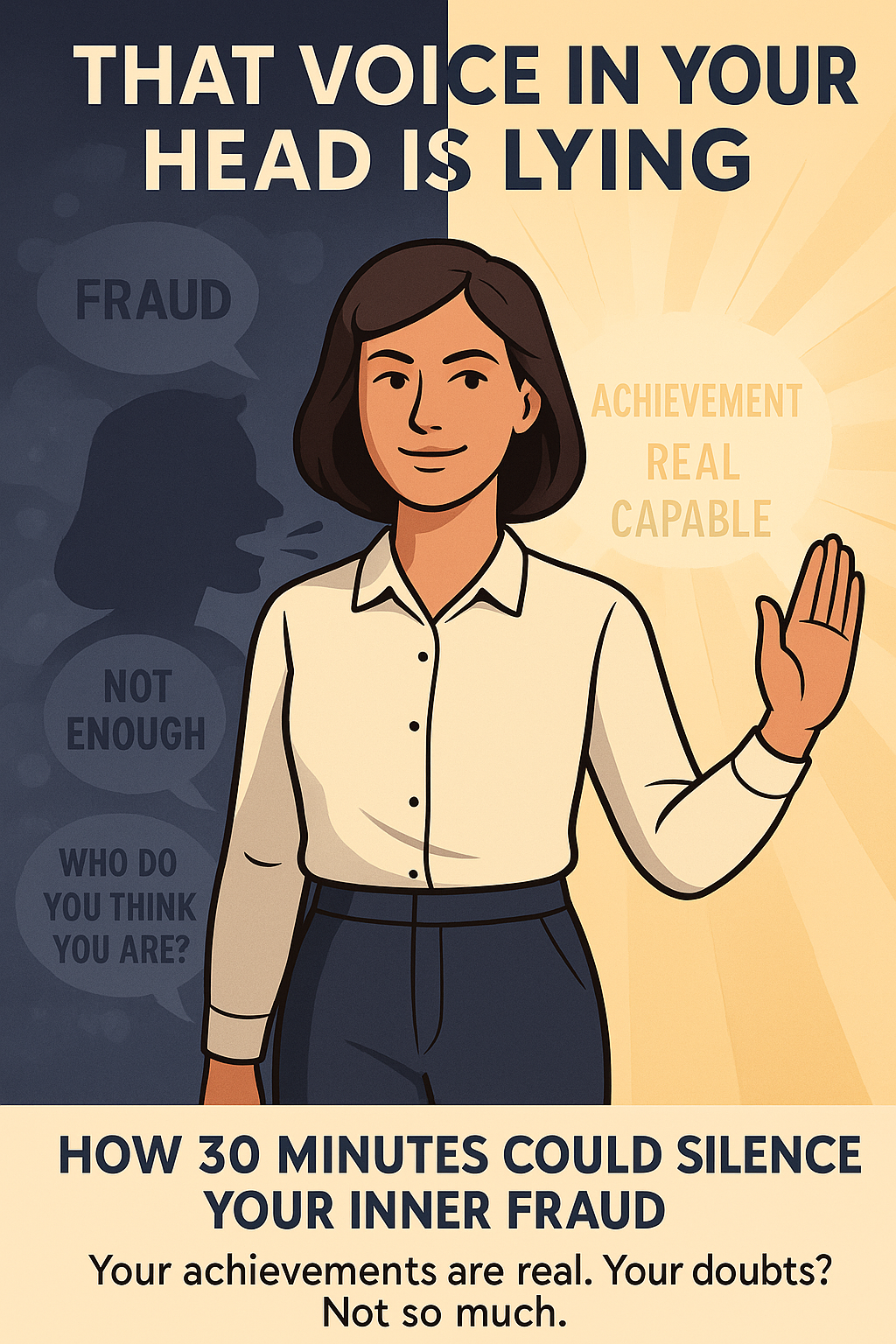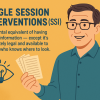Imposter Syndrome
That Voice in Your Head is Lying
How 30 Minutes Could Silence Your Inner Fraud
Your achievements are real. Your doubts? Not so much.
Sarah stared at her promotion letter, waiting for someone to burst through the door and announce a mistake. Despite leading three successful projects and receiving glowing reviews, she was convinced HR would discover she didn't deserve this role. "They'll figure out I've been faking it," she thought, her chest tightening with familiar anxiety.
If this sounds like you, you're experiencing what high-achieving individuals who, despite their objective successes, fail to internalize their accomplishments and have persistent self-doubt and fear of being exposed as a fraud or impostor know as imposter syndrome.
😰 The Hidden Epidemic Among High Achievers
Here's a statistic that might surprise you: 50% of UK adults have been affected by imposter syndrome. Among certain groups, the numbers climb even higher. Gen Z (66%) and millennials (58%) report experiencing these feelings of fraudulence.
The truth is, imposter syndrome doesn't discriminate. It affects:
🎓 Medical students drowning in coursework
💼 Corporate executives leading teams
🏥 Healthcare workers saving lives
🚀 Entrepreneurs building businesses
Women (54%) feel they have experienced imposter syndrome, compared with just 38% of men, though research indicates women scored higher than men with a mean effect size (Cohen's d) of 0.27 across multiple studies.
⚡ The 30-Minute Solution You Haven't Tried
Imagine walking into a session feeling like a fraud and walking out with concrete tools to challenge those thoughts. No months of therapy. No waitlists. Just you, a trained professional, and 30 minutes to rewire how you think about your accomplishments.
This is where single-session interventions (SSIs) shine. Unlike traditional therapy, SSIs deliver targeted, evidence-based techniques in one focused session. Think of it as precision medicine for your mind – because research shows impostor syndrome is a stronger predictor of mental health issues than minority status stress.
🧠 The Science Behind Rapid Change
SSIs work because they target the core mechanisms of imposter syndrome using proven approaches:
Cognitive Behavioral Therapy (CBT) techniques help you identify and challenge the automatic thoughts that fuel imposter feelings. In just 30 minutes, you learn to catch thoughts like "I just got lucky" and examine them objectively.
Acceptance and Commitment Therapy (ACT) approaches teach you to accept uncomfortable feelings while taking values-driven action. You don't need to feel 100% confident to act confidently.
Growth Mindset Interventions shift your fundamental beliefs about ability and success, helping you see challenges as opportunities rather than threats of exposure.
✅ What Changes in 30 Minutes
In a single session, you could:
✓ Identify your unique imposter triggers
✓ Learn evidence-based thought challenging
✓ Develop a personalized confidence toolkit
Here's what typically happens:
🔹 Recognition: You learn to spot imposter thoughts as they arise. That voice saying "they'll find out" becomes identifiable as a symptom, not truth.
🔹 Reality-Testing: You practice examining evidence for and against your fraudulent feelings. Most people discover their accomplishments have solid foundations.
🔹 Reframing: You develop new, balanced ways of thinking about success and failure that honor both your efforts and your growth areas.
❓ "But Will It Really Work For Me?"
Q: How can 30 minutes make a real difference?
SSIs are designed for maximum impact. By focusing on one specific issue with proven techniques, you get targeted help exactly where you need it. Research indicates that many interventions, whether psychotherapeutic or non-psychotherapeutic, take a CBT-inspired approach to address IP successfully.
Q: I've tried positive thinking and it doesn't work.
This isn't about positive thinking. SSIs teach you evidence-based techniques from clinical psychology. You'll learn to evaluate thoughts objectively, not just replace them with happy ones.
Q: What if my imposter syndrome comes back?
The tools you learn in an SSI stay with you. While feelings might resurface, you'll have specific strategies to handle them. Many people find that one session provides enough skills to manage future episodes independently.
🎯 Your Next Step: From Fraud to Confident
Living with imposter syndrome means carrying an exhausting secret. Every achievement feels borrowed. Every compliment seems undeserved. Every day brings the fear of being "found out."
But here's what's actually true: Imposter syndrome does not reflect a person's actual competence or abilities. Your achievements are real. Your capabilities are genuine. You just need the right tools to see it.
Ready to silence your inner critic?
In just 30 minutes, you could have evidence-based tools to challenge imposter thoughts, build lasting confidence, and finally own your achievements.
Start Your Session Take the first step Learn More About single-session interventions
Mind Hack Lab provides science-backed single-session interventions for adults 18+ ready to transform their thinking. Your success story is waiting.







